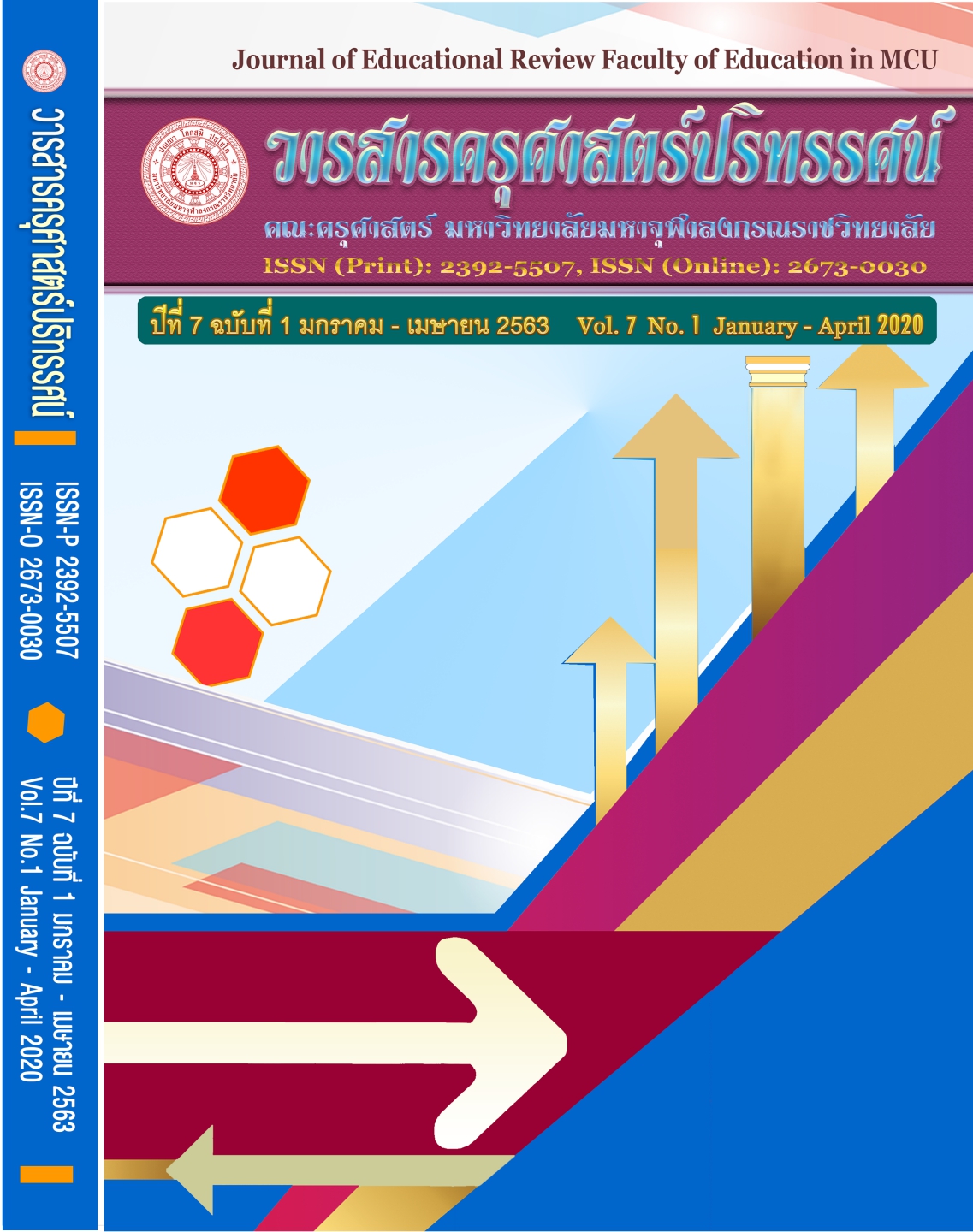DEVELOPMENT OF CHARACTERISTICS BASED ON BRAHMAVIHARADHAMMA FOR SCHOOL ADMINISTRATORS
Main Article Content
Abstract
The objective of this research paper is to propose a development of the characteristics of the Brahmavihara Dharma. For school administrators Mixed research There are 3 research steps which are step 1: study the characteristics of school administrators in elementary schools Questionnaires were used by 400 primary school teachers. Data were analyzed using descriptive statistics such as frequency, percentage, mean, and standard deviation. Step 2: Development of Brahma Vihara By interviewing 24 important information with a semi-structured interview form Data was analyzed by content analysis. And step 3 proposing the development of the characteristics of the Brahmavihara Dharma By a group of 17 experts with questions for the group discussion. Data was analyzed by content analysis. The conclusion of the research shows that Development of the Brahmavihara Dharma Characteristics For school administrators It consists of 4 main components which are 1 component, principles 1) Principles of school administration Is the process of working in schools in 4 areas which are academic administration Budget management Personnel management General administration 2) Characteristics of school administrators Is the physical characteristics and behavioral expression of the person who is a part of the character, showing it to others to see 4 things, namely knowledge and ability Social maturity and tolerance Responsible Have good human relations 3) Phrawisawitham It is a principle that must be kept as the heart for the executives in 4 things which are mercy, love, good wishes, want others to be happy, compassion, compassion, thoughts, help to be free from suffering, joyfulness, when others are happy, have equality, neutral mind. Element 2: Objective, Element 3: Implementation system and component 4: Process of integrating the school administrators' characteristics with the Brahmavihara In summary, the knowledge from the research is CBS.
Article Details
ทัศนะและความคิดเห็นที่ปรากฏในบทความในวารสารฉบับนี้ถือเป็นความรับผิดชอบของผู้เขียนบทความนั้นเพียงผู้เดียว และไม่ถือเป็นทัศนะและความรับผิดชอบของกองบรรณาธิการ
กองบรรณาธิการขอสงวนสิทธิ์ในการคัดเลือกบทความลงตีพิมพ์และจะแจ้งให้เจ้าของบทความทราบหลังจากผู้ประเมินบทความตรวจอ่านบทความแล้ว
ต้นฉบับที่ได้รับการตีพิมพ์ในวารสารครุศาสตร์ปริทรรศน์ คณะครุศาสตร์ มหาวิทยาลัยมหาจุฬาลงกรณราชวิทยาลัย ถือเป็นกรรมสิทธิ์ของคณะครุศาสตร์ มหาวิทยาลัยมหาจุฬาลงกรณราชวิทยาลัย ห้ามนำข้อความทั้งหมดหรือบางส่วนไปพิมพ์ซ้ำ เว้นเสียแต่ว่าจะได้รับอนุญาตจากมหาวิทยาลัยฯ เป็นลายลักษณ์อักษร
References
กระทรวงศึกษาธิการ. (2562). พระราชบัญญัติการศึกษาแห่งชาติ พ.ศ. 2562. กรุงเทพมหานคร: โรงพิมพ์คุรุสภา.
ทิศนา แขมมณี. (2555). ศาสตร์การสอน: องค์ความรู้เพื่อการจัดกระบวนการเรียนรู้ที่มประสิทธิภาพ. กรุงเทพมหานคร: จุฬาลงรณมหาวิทยาลัย.
ธานินทร์ ศิลป์จารุ. (2552). การวิจัยและวิเคราะห์ข้อมูลทางสถิติด้วย SPSS. พิมพ์ครั้งที่ 10. กรุงเทพมหานคร: บิสซิเนสอาร์แอนด์ดี.
ธีระ รุญเจริญ. (2555). ผู้บริหารศึกษามืออาชีพ : ศักยภาพเพื่อการปฎิรูปการเรียนรู้. พิมพ์ครั้งที่ 2.กรุงเทพมหานคร: เยลโล่การพิมพ์.
ประคอง รัศมีแก้ว. (2551). คุณลักษณะผู้นำของผู้บริหารในสถานศึกษาที่มีคุณภาพ. ดุษฎีนิพนธ์ปรัชญาดุษฎีบัณฑิต. มหาวิทยาลัยศิลปากร.
ประเวศ วะสี. (2550). การเรียนรู้ใหม่ไปให้พ้นวิกฤต. กรุงเทพมหานคร: ร่วมด้วยช่วยกัน.
พระพรหมคุณาภรณ์ (ป. อ. ปยุตฺโต). (2559). ธรรมนูญชีวิต. พิมพ์ครั้งที่ 99. กรุงเทพมหานคร: สหธรรมิก.
พระพรหมบัณฑิต (ประยูร ธมฺมจิตฺโต). (2556). สมเด็จพระมหาสมณเจ้า กรมพระยาวชิรญาณวโรรสกับการปฏิรูปการศึกษาพระพุทธศาสนา. กรุงเทพมหานคร: สามลดา.
พัฐณสิญ นวโลจิตรัตน์, พระมหาสหัส ฐิตสาโร, สิน งามประโคน. (2560). รูปแบบการพัฒนาคุณลักษณะผู้นำแบบไทยอันพึงประสงค์ของผู้บริหารสถานศึกษา สังกัดสำนักงานเขตพื้นที่การศึกษา มัธยมศึกษา ภาคกลาง. วารสารครุศาสตร์ปริทรรศน์ คณะครุศาสตร์ มหาวิทยาลัยมหาจุฬาลงกรณราชวิทยาลัย. 4(2). 40-55.
มหาวิทยาลัยจุฬาลงกรณราชวิทยาลัย. (2539). พระไตรปิฎกฉบับภาษาไทย ฉบับจุฬาลงกรณราชวิทยาลัย. กรุงเทพมหานคร: โรงพิมพ์มหาจุฬาลกรณราชวิทยาลัย.
วิรัญญ์ บิดรวัฒนา และคณะ. (2553). ผู้นำแห่งโลกอนาคตการบริหารจัดการแบบมืออาชีพ. พิมพ์ครั้งที่ 2. กรุงเทพมหานคร: อัลฟ่ามีเดีย.
ศุขภิญญา ศรีคําไทย, พระมหาญาณวัฒน์ ฐิตวฑฺฒโน, อุทัย สติมั่น. (2563). รูปแบบการบริหารการศึกษาตามหลักสัมมาสติ. วารสารสังคมศาสตร์และมานุษยวิทยาเชิงพุทธ. 5(2). 421-435.
สงวน สุทธิเลิศอรุณ. (2550). พฤติกรรมมนุษย์กับการพัฒนาคน. พิมพ์ครั้งที่ 7. กรุงเทพมหานคร: อักษราพิพัฒน์.
สัมมา รธนิธย์. (2553). ทฤษฎีและปฏิบัติการบริหารการศึกษา. กรุงเทพมหานคร: ข้าวฟ่าง.
หัชพันธ์ เอื้อโชติคุณ. (2557). คุณลักษณะผู้นําที่ไม่ดีที่มีผลในเชิงลบต่อขวัญกําลังใจในการทํางานของผู้ตาม. ดุษฎีนิพนธ์ปรัชญาดุษฎีบัณฑิต. สถาบันบัณฑิตพัฒนบริหารศาสตร์.


